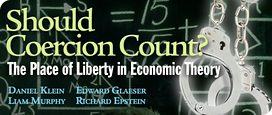Liam writes:
The obvious substantive issue in dispute between libertarians and the rest of us … is the little matter of whether there are pre-institutional property rights …
Is Liam trying to boil it all down to one dichotomy, namely, either: (1) the governmental legal rules that actually exist, or (2) nonsense-upon-stilts (Jeremy Bentham’s epithet for natural rights)?
If so, that is ill-considered.
I too reject the idea of a grammar of absolute deontological rights, prior and invariant to human experience and institutions. Such a view resembles a theological theory of rights. I have faulted the libertarian school of Murray Rothbard for tending to see it that way (something for which Richard and I knocked Walter Block). I favor Rothbard’s definition of liberty (and would credit him with defining it more thoroughly than anyone else, primarily in The Ethics of Liberty), but I do not favor the claims he made for liberty.
But if Liam is saying that there are no other important distinctions to be made, if, more specifically, he is saying that the voluntary/coercive distinction doesn’t really cohere and pertain, then I disagree. I am concerned that Liam wants to caricature all libertarians as Rothbardians (or perhaps ASU Nozickians) and then limit his critique to that caricature.
The main problem with the view that there are only two things, actual governmental legal rights and nonsense, is that it denies all other distinctions and categories that work to refine and advance our understanding and evaluation of rules. Rules and principles emerge from sources other than government. They often exist and function apart from and even in opposition to the government rules (e.g., black markets, as Walter Block has highlighted, are often heroic, and Robert Ellickson’s classic study of ranching in Shasta County, California). Moreover, rules and principles can exist in our minds even when contravened in institutional practice. The most pervasive and important constable is the impartial spectator. In fact, she too is an institution of sorts.
Regarding “positive liberty,” like Richard, I urge people not to call human capabilities “liberty.” Otherwise, you have to say that catching the flu is a diminution of liberty. It cheapens the term. It dilutes and confuses the important classical liberal meaning of liberty, a tradition to which we owe so, so much. I see Liam’s expansive usage of “liberty” as part of that semantic subversion mentioned previously. I disagree with his statement: “it is obvious that nothing of significance for political theory turns on the correct meaning of words.” Semantic confusion can destroy ideas and distinctions that have been crucial in the cultural traditions within which our theorizing is embedded.
Liam writes: “The classical liberal notion is simply the negative liberty of being able to do what you want to do without interference.” If he means to say that the classical liberal notion of liberty holds that sanctions against murder are a diminution of liberty, I say he’s wrong. You find things to that effect in Hobbes, Bentham, and Austin, but not in the people who define classical liberalism—e.g., Locke, Sidney, the Scots, the American founders, von Humboldt, the French liberals (many generations), the Abolitionists, J.S. Mill, Cobden, Bright, Spencer, Morley, and so on. What you find there is quite contrary to what Liam claims. The classical liberal notion of liberty is what Liam says the libertarian notion is (though we would have to be careful about “rights”). If there is one man who forms the bridge between classical liberalism and modern libertarianism, it is Ludwig von Mises, and, on the definition of liberty, he represents only continuity.
A quick follow-up to Richard’s latest:
Hear, hear. State redistribution coerces the taxed party and it does not enlarge anyone’s liberty (it makes them wealthier), and hence clearly contravenes the classical liberal/libertarian conception of liberty. I mostly oppose the welfare state, but the case against it is nothing like a silver bullet. A dollar means more to a poor person than to a rich person.

